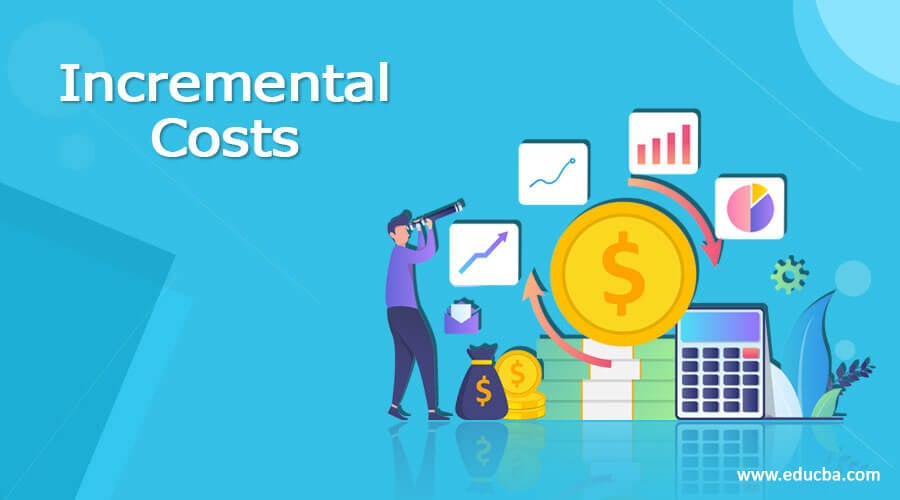Updated July 12, 2023
Definition of Incremental Costs
The company incurs additional costs due to the production of an additional unit or service or other factors, such as replacing machinery or equipment or adding a new product. These costs are referred to as incremental costs.
Explanation
The incremental cost is the production cost of producing an additional unit by the company. It does not consider the company’s fixed costs because generally, the fixed costs like the factory’s rent and the employees’ salaries are not changed due to the additional unit produced by the company. Only variable production costs, like raw material and variable labor, are included in the calculation of incremental cost.
How Does Incremental Costs Work?
- The incremental cost of production only considers the variable costs incurred for the production of additional units produced by the company, thus ignoring the fixed costs of production already incurred by it.
- The method of calculating the incremental cost is the Total cost of production of existing units-Total the cost of production of an additional unit= Incremental Cost.
- Firstly, the total cost of production of existing units calculates. After that, the cost of producing the additional unit calculates, considering the raw material cost and other variable costs. Then we subtract the additional units’ cost from the existing units’ cost.
- Then the total cost compares. Generally, the product’s total costs increase due to increased variable costs. However, when we consider the per unit cost of the product, it reduces due to the improved economies of scale.
Example of Incremental Costs
Let’s consider Company ABC Ltd, which is the manufacturing company. It produces product A, costing 1,000 units of product A $5,000. Considering the market’s demand, the company decided to produce one more product, B, in its factory, and with this, the total production increased to 2000 units. The company has to incur additional costs to produce product B in the form of raw materials, labor costs, salary, etc. Product B will produce from the same machinery and equipment from which Product A was produced. The company decides to produce product B and the total cost of production of total2000 units by the company comes to $7,500.So, the incremental cost will calculate as follows:
ABC Ltd.
| Particulars | Value |
| No. Of units of Product A | 1000 |
| Cost of Production of Product A | $5,000 |
| Total number of units of production | 2000 |
| Total cost of production by the company | $7,500 |
| Total Incremental cost ($7,500 – $5,000) | $2,500 |
| Units | Cost | Per unit cost |
| 1000 | $5,000 | $5 |
| 2000 | $7,500 | $3.75 |
The above example shows that the total incremental cost is $2,500, but when we calculate the per unit cost of production, it gets reduced from $5 to $3.75.
Factors Influencing Incremental Costs
The Fixed and variable costs are mainly two factors affecting the incremental costs. The fixed production costs do not change or increase with the increase in the production volume. Hence, reducing the fixed costs per unit improves the product’s profit margin. The variable cost of production changes with the volume of the production units. The more production units, the more the variable costs of production.
Advantages
The following are the advantages of Incremental Costs:
- The incremental cost helps the companies analyze the cost of production with the production of the additional units it produces.
- Such cost analysis helps the company improve the efficiency of its production units, thus encouraging cost savings and profitability improvement.
- Incremental costs help the company in its decision-making regarding the production of the units, like whether it can produce the additional units or whether it will be feasible for the company to purchase them from outside.
- Also, once the company determines the incremental costs, the product’s retail price can also be easily calculated.
- The company can clearly understand its profitability statement from the present and future perspectives.
- Generally, per unit of product cost reduce with the production of additional units and by incurring incremental costs. Hence, it improves the company’s economies of scale by improving its production volume.
- Incremental Costs also help the company in comparative analysis between two available alternatives. The company can decide when the other costs of the two alternatives are the same, considering its incremental costs.
Disadvantages
The following are the disadvantages of Incremental Costs:
- The company faces a lot of difficulty in analyzing fixed and variable production costs. Thus, it results in a lot of time wastage in this activity.
- The time factor is ignored while considering the fixed and variable costs of production. Sometimes, the cost that is fixed today can be variable in the long run.
- Generally, the fixed cost is ignored in the incremental cost calculation. While in reality, the fixed cost occupies the major portion of the total cost of production.
Conclusion
The incremental cost of the company helps the company in the analysis of various decisions like the decisions regarding the production of the new product line in the company, the decisions regarding the acceptance of the offered orders from the customers, decisions regarding the price changes of the product or the service, and the decision regarding the allocation of various resources to optimize the utilization of these resources, etc. So, the proper allocation of incremental costs helps the company in various decision-making processes and for the proper presentation of its accounts.
Recommended Articles
This is a guide to Incremental Costs. Here we also discuss the introduction and how incremental costs work. Along with advantages and disadvantages. You may also have a look at the following articles to learn more –


